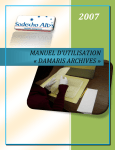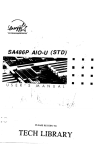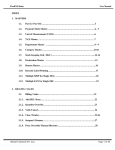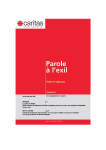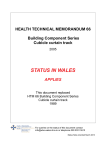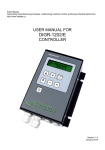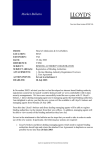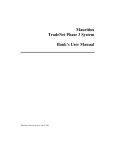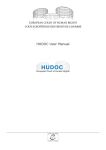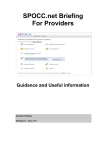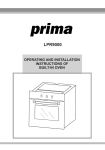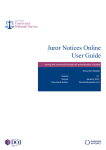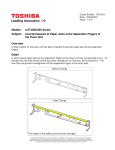Download Dependants on an asylum support application
Transcript
Dependants on an asylum support application
Table of contents
1 Introduction
1.1 Definition of dependant
1.2 Application of this instruction in respect of children and those with children
2 Dependants included on the initial support application
2.1 Persons who are already a dependant on the asylum claim
2.2 Persons who are not a dependant on the asylum claim
3 Applications to add dependants after support has been allocated
3.1 Adding British citizen dependants and persons with valid leave
3.2 Date support should commence from
3.3 New born dependants
4 Removing a dependant after support has been allocated
5 Non-dependants who request to be accommodated together
6 Child dependants turning 18
7 Extract From the Asylum Support Regulations 2000 (regulation 2)
8 Letters
8.1 Request for further evidence letter
8.2 Variation of support letter
9 Document control
9.1 Change record
Dependants On An Asylum Support Application, version 8
1 Introduction
This is an instruction on determining whether a person is a dependant for asylum support
purposes. It also includes guidance on adding dependants to, and removing dependants
from, an asylum support application. The principles set out in this instruction apply
irrespective of whether the application for support is under section 4, 95 or 98 of the
Immigration and Asylum Act 1999.
1.1 Definition of dependant
For support purposes, a "dependant" is a person who meets one or more of the definitions
in regulation 2 of the Asylum Support Regulations 2000 (see Extract).
For general asylum purposes, dependants are defined in the Asylum Instruction
Dependants.
Back to contents
1.2 Application of this instruction in respect of children and those with children
Section 55 of the Borders, Citizenship and Immigration Act 2009 requires the Home Office
to carry out its existing functions in a way that takes into account the need to safeguard
and promote the welfare of children in the UK. It does not impose any new functions, or
override existing functions.
Officers must not apply the actions set out in this instruction either to children or to those
with children without having due regard to Section 55. The Home Office
instruction ‘Arrangements to Safeguard and Promote Children’s Welfare in the United
Kingdom sets out the key principles to take into account in all Home Office activities.
Our statutory duty to children includes the need to demonstrate:
Fair treatment which meets the same standard a British child would receive;
The child’s interests being made a primary, although not the only consideration;
No discrimination of any kind;
Asylum applications are dealt with in a timely fashion;
Identification of those that might be at risk from harm.
Back to contents
Dependants On An Asylum Support Application, version 8
2 Dependants included on the initial support application
When an application for a dependant to be included in a support application is received,
caseworkers should ensure that they search ASYS and CID for any existing asylum or
asylum support applications for the person.
2.1 Persons who are already a dependant on the asylum claim
In line with regulation 2(4)(i) of the Asylum Support Regulations 2000, a person should
always be regarded as a dependant for support purposes if they are being treated as a
dependant on an asylum claim. In this scenario, the dependant is not expected to provide
any additional evidence of their relationship to the principal applicant.
Back to contents
2.2 Persons who are not a dependant on the asylum claim
A person may be treated as a dependant for support purposes, even if they are not a
dependant on an asylum claim, provided that they meet one of the criteria set out in
regulation 2 of the Asylum Support Regulations 2000 (see Extract).
The prospective dependant will be expected to provide evidence to show that their
relationship with the main support applicant is genuine. The level of evidence that is
acceptable to demonstrate such a relationship will vary according to the circumstances of
the particular case. For example, it may not always be reasonable to expect a couple who
have fled persecution to be able to provide a marriage certificate unless the marriage has
taken place since they arrived in the UK. Factors such as whether the alleged dependant
was mentioned during the initial Immigration Service screening interview may be important
when it comes to assessing credibility. Forgery checks should be conducted on any
documentary evidence wherever possible.
If, after considering the evidence provided, the caseworker is not satisfied that the
purported dependant should be included in the support application, the reasons for the
decision should be set out in writing. Caseworkers should refer to ASYS User Manual
Producing a Generic ASYS Letter and use the template provided. The decision will attract
a right of appeal under Section 103(1) of the Immigration and Asylum Act 1999 to an
Asylum Support Judge. The letter should enclose the Tribunals Service – Asylum Support
Notice of Appeal Form and envelope.
Back to contents
Dependants On An Asylum Support Application, version 8
3 Applications to add dependants after support has been
allocated
A request for a prospective dependant to be added to a support application should be
made in writing. Evidence must be provided to show that the person meets the
requirements of a dependant as set out in regulation 2 of the Asylum Support Regulations
2000 (see Extract).
It is not necessary for dependants to submit a new asylum support application form (ASF1)
when applying to be added as a dependant to an existing asylum support claim.
If a failed asylum seeker is still being treated as an asylum seeker for support purposes
because they had a dependent child under the age of 18 at the point appeal rights were
exhausted, additional dependants may be added to the section 95 application (providing
they meet the definition of a dependant (see Extract).
If appropriate evidence has not been received, caseworkers should write to the applicant
requesting further information using the template at Letters.
If, the caseworker is not satisfied that the purported dependant is eligible to be included in
the support application, the reasons for the decision should be set out in writing.
Caseworkers should refer to ASYS User Manual Producing a Generic ASYS Letter and
use the template provided. This decision will attract a right of appeal to an Asylum Support
Tribunal Judge. The letter should enclose the Tribunals Service – Asylum Support Notice
of Appeal Form.
If it is decided that the applicant is eligible to be added to the support application,
caseworkers should follow the instructions in the ASYS User Manual: Adding/Removing a
Dependant.
The applicant should be advised of the decision in writing. Caseworkers will need to
produce a generic ASYS letter - see ASYS User Manual Producing a Generic ASYS Letter
and enter the text provided at Letters.
In cases where the applicant is residing in support accommodation caseworkers need to
assess whether the current accommodation remains suitable for the newly amended
household.
To check suitability of the applicant’s accommodation
Open the ASYS application
Click Accommodation (Tab 6)
The text box - Type of Accommodation gives the number of people that the
accommodation can support. The accommodation is unsuitable for the applicant if the
accommodation cannot support the number of family members living there.
If the current accommodation is deemed to be unsuitable, the details of the case should be
referred to the Relocations inbox. If the current accommodation is deemed to be suitable,
caseworkers should assess the level of support and allocate support, see the ASYS User
Manuals: Using the Automated Assessment Tool and Using the Subsistence "Allocation
Calculator" Tool.
Dependants On An Asylum Support Application, version 8
If new accommodation needs to be found caseworkers should refer to the Asylum
Instruction Change of Address for further guidance.
Where a dependant has been added, caseworkers must place a minute in the ASYS
Minute Sheet. The minute must include the name of applicant who has been added (or
removed), any changes in the level of support the main applicant will receive, the date the
new level of support will commence and details of any emergency support generated in the
interim.
3.1 Adding British citizen dependants and persons with valid leave
The definition of dependant for support purposes does not exclude British citizens or
persons with valid leave to remain in the UK. However, caseworkers must take into
account the sources of income likely to be available to these persons and make
appropriate enquiries to establish destitution.
The section Applications to add dependants after support has been allocated sets out the
evidence required to add a dependant and the action Officers must take when adding or
refusing to add a dependant.
Back to contents
3.2 Date support should commence from
When a decision is made to add a new dependant (with the exception of new born babies)
the provision of subsistence support should be backdated to commence on the day that the
Home Office received sufficient supporting evidence of the relationship.
When determining the date that supporting evidence was received, caseworkers should
look for the date that the evidence was entered on to ASYS. Evidence received should
have been minuted in tab 5 on ASYS by the person who scanned the evidence onto ASYS
and be visible in tab 9 (Correspondence).
3.3 New born dependants
In the case of new born dependants, subsistence support should be backdated to
commence from the date of the birth provided there is sufficient supporting evidence of the
birth. An original letter or certificate recording the birth of the child that has been issued by
a treating clinician or hospital may be accepted as interim evidence to establish the
relationship and register the child as a dependant. If this evidence is provided within 14
calendar days of the birth subsistence support should be backdated to the date of birth. If
the evidence is provided after 14 calendar days of birth subsistence support should only be
backdated if there is a reasonable explanation for the delay.
Although documentation from clinicians may be accepted as interim evidence of the newly
born child’s relationship to the supported person the full birth certificate should still be
requested and generally be provided within 49 calendar days. The support claim should be
reviewed if the full certificate is not provided within that time (N.B. parents are required to
register a birth within 42 calendar days of delivery).
Payments to accommodation providers should generally commence at the same time
subsistence payments commence. However, where earlier notification of the addition of a
newly born child to the household is received direct from the accommodation provider
(through the relevant “discrepancy report”) payment to the provider should normally
commence from the date of that notification.
Dependants On An Asylum Support Application, version 8
4 Removing a dependant after support has been allocated
A request for a dependant to be removed from a support application should be made in
writing.
If caseworkers are concerned about the welfare of a child dependant they should, in the
first instance, contact Social Services.
Where a dependant wishes to be removed from a main applicant’s asylum support
application, the main applicant should be informed that the person no longer wants to be
supported as his/her dependant. Caseworkers should be aware that it may not be
reasonable to expect confirmation from the main applicant in some circumstances and
should pay particular attention to the circumstances of the case. For example, if the
dependant is subject to domestic violence it would not be reasonable to expect signed
confirmation.
Whenever a dependant is removed from a support application the level of support provided
will need to be adjusted to reflect the reduction in people on the application. If the
applicant is living in asylum support accommodation which, following the removal of a
dependant is not suitable, new accommodation may need to be found. Caseworkers
should refer to the Asylum Instruction Change of Address for guidance.
Caseworkers should also be aware that removing a dependant from a support application
may have implications for the support arrangements for the main applicant. For example, if
the main applicant is a failed asylum seeker who was only receiving section 95 support
because he has a child under 18, the caseworker will need to review the position if the
child is no longer regarded as a dependant and a part of the main applicant’s household.
Caseworkers may be notified by the police, the accommodation provider, the main
applicant or dependant that they wish to be removed from the asylum support application
because of incident(s) of domestic violence. Caseworkers should refer to Asylum Support
Policy Bulletin 70: Domestic Violence and the Asylum Instruction titled Change of Address.
If it is decided that the applicant should be removed from the support application,
caseworkers should follow the instructions in the ASYS User Manual: Adding/Removing a
Dependant.
The applicant should be advised of the decision in writing. Caseworkers will need to
produce a generic ASYS letter- see ASYS User Manual Producing a Generic ASYS Letter
and enter the text provided at Letters.
In cases where the applicant is residing in support accommodation caseworkers need to
assess whether the current accommodation remains suitable. Caseworkers should check
whether the current accommodation remains suitable.
Back to contents
Dependants On An Asylum Support Application, version 8
If the current accommodation is unsuitable, the details of the case should be referred to the
Relocations inbox. If the current accommodation is suitable, caseworkers should assess
the level of support and allocate support.
Where a dependant has been removed, caseworkers must place a minute in the ASYS
Minute Sheet. The minute must include the name of the dependant who has been
removed, any changes in the level of support the applicant will receive, the date the new
level of support will commence and details of any emergency support generated if
appropriate.
Back to contents
Dependants On An Asylum Support Application, version 8
5 Non-dependants who request to be accommodated together
Applicants who are eligible for asylum support but are not dependants of each other (for
example, adult siblings) may request to be accommodated together. When considering
requests for separate support applications to be ‘linked together’ in this way, caseworkers
should take into account the wishes of all parties, the availability of suitable
accommodation, Article 8 ECHR considerations (right to respect for private and family life),
and any restrictions on who may be accommodated together as laid out in Annex C of the
COMPASS Statement of Requirements.
The caseworker should advise the applicants of the decision in writing. Caseworkers
should refer to ASYS User Manual Producing a Generic ASYS Letter and use the template
provided. There is not a right of appeal against a negative decision in this regard.
Back to contents
Dependants On An Asylum Support Application, version 8
6 Child dependants turning 18
Children who have been accepted as a dependant on an asylum support application
should not be expected to apply for support in their own right on turning 18 unless the main
applicant is a failed asylum seeker and has no other child dependants. Their support will
continue until such time as the main applicant becomes ineligible for support.
Back to contents
Dependants On An Asylum Support Application, version 8
7 Extract from the Asylum Support Regulations 2000
(regulation 2)
2.
(1)
In these Regulations -
"the Act" means the Immigration and Asylum Act 1999;
"asylum support" means support provided under section 95 of the Act;
"dependant" has the meaning given by paragraphs (4) and (5);
"the interim Regulations" means the Asylum Support (Interim Provisions) Regulations
1999[2];
"married couple" means a man and woman who are married to each other and are
members of the same household; and
"unmarried couple" means a man and woman who, though not married to each other, are
living together as if married.
(2)
The period of 14 days is prescribed for the purposes of section 94(3) of
(day on which a claim for asylum is determined).
the Act
(3)
Paragraph (2) does not apply in relation to a case to which the interim Regulations
apply (for which case, provision corresponding to paragraph (2) is made by
regulation 2(6) of those Regulations).
(4)
In these Regulations "dependant", in relation to an asylum-seeker, a supported
person or an applicant for asylum support, means, subject to paragraph (5), a
person in the United Kingdom ("the relevant person") who (a) is his spouse;
(b) is a child of his or of his spouse, is dependant on him and is, or was at the
relevant time, under 18;
(c) is a member of his or his spouse's close family and is, or was at the relevant
time, under 18;
(d) had been living as part of his household (i) for at least six of the twelve months before the relevant time, or
(ii) since birth,
and is, or was at the relevant time, under 18;
(e) is in need of care and attention from him or a member of his household by
reason of a disability and would fall within sub-paragraph (c) or (d) but for the
fact that he is not, and was not at the relevant time, under 18;
(f) had been living with him as a member of an unmarried couple for at least two
of the three years before the relevant time;
(g) is living as part of his household and was, immediately before 6th December
1999 (the date when the interim Regulations came into force), receiving
assistance from a local authority under section 17 of the Children Act 1989[3];
Dependants On An Asylum Support Application, version 8
(h) is living as part of his household and was, immediately before the coming
into force of these Regulations, receiving assistance from a local authority
under (i) section 22 of the Children (Scotland) Act 1995[4]; or
(ii) Article 18 of the Children (Northern Ireland) Order 1995[5]; or
(i) has made a claim for leave to enter or remain in the United Kingdom, or for
variation of any such leave, which is being considered on the basis that he is
dependant on the asylum-seeker; and in relation to a supported person, or an
applicant for asylum support, who is himself a dependant of an asylum-seeker,
also includes the asylum-seeker if in the United Kingdom.
(5)
Where a supported person or applicant for asylum support is himself a dependant of
an asylum-seeker, a person who would otherwise be a dependant of the supported
person, or of the applicant, for the purposes of these Regulations is not such a
dependant unless he is also a dependant of the asylum-seeker or is the asylumseeker.
(6)
In paragraph (4), "the relevant time", in relation to the relevant person, means (a) the time when an application for asylum support for him was made in accordance
with regulation 3(3); or
(b) if he has joined a person who is already a supported person in the United
Kingdom and sub-paragraph (a) does not apply, the time when he joined that person
in the United Kingdom.
(7)
Where a person, by falling within a particular category in relation to an asylumseeker or supported person, is by virtue of this regulation a dependant of the
asylum-seeker or supported person for the purposes of these Regulations, that
category is also a prescribed category for the purposes of paragraph (c) of the
definition of "dependant" in section 94(1) of the Act and, accordingly, the person is a
dependant of the asylum-seeker or supported person for the purposes of Part VI of
the Act.
(8)
Paragraph (7) does not apply to a person who is already a dependant of the asylumseeker or supported person for the purposes of Part VI of the Act because he falls
within either of the categories mentioned in paragraphs (a) and (b) of the definition
of "dependant" in section 94(1) of the Act.
(9)
Paragraph (7) does not apply for the purposes of any reference to a "dependant" in
Schedule 9 to the Act.
Back to contents
Dependants On An Asylum Support Application, version 8
8 Letters
8.1 Request for further evidence letter
Dear
Thank you for your letter requesting the addition of your family members to your Asylum
Support application.
The Home Office is unable to consider your request, as the following information is
required:
Your Dependant’s SAL 1 or ARC Card
Complete details of dependant (Full name, Date of birth, relationship to you)
Asylum support reference number of your dependant (If possible)
Original Full Birth Certificate
Signed confirmation from your partner and yourself stating who will be the main
applicant
We are unable to consider your request, at the present moment, without this information.
We have not retained a copy of your request, therefore, should you wish to pursue this
matter you will need to re-submit your request with the above information within 5 working
days.
A pre-paid, self-addressed, envelope is enclosed for your convenience.
Yours Sincerely
[Caseworkers name]
Back to contents
8.2 Variation of support letter
Dear
This letter is confirmation that………….….has been added/removed as a dependant to this
application. Your regular support payments provided to you by the Home Office have been
amended taking into consideration your current needs. The details of the support you will
now receive is as follows:
Within 2 working days from the date of this letter, Sodexho Pass will be delivering (or will
have delivered) an Emergency Support Token to your current address by courier. The
Emergency Support Token is to the value of £00.00 and is to cover the period
Day/Month/2007 until Day/Month/2007. This is to cover your essential living needs until
your regular cash payments are available for collection from the Post Office.
Dependants On An Asylum Support Application, version 8
You must make every effort to be at home to receive this pack, if you are not you will be left
a telephone number to ring to arrange re-delivery. You will need to give your asylum
support reference number to the courier and you must sign to confirm receipt of the pack.
Your Emergency Support Token must to be cashed at your designated Post Office. If you
are not sure which is your designated post office, please contact the Sodexho Pass
Helpline on 01276 687 099. Please note that no additional emergency support will be sent
to you within the above period and therefore it is important that you carefully monitor your
expenditure.
Your regular cash voucher issue has been amended, following the change to your current
circumstances. The new details are outlined below:
Start Date
Day/Month/Year
Day/Month/Year
End Date
Day/Month/Year
Ongoing
Value
£00.00
£00.00
You are reminded that you are still required to comply with the terms of the agreement sent
to you by Asylum Support when your original support package was provided.
It is your responsibility to inform the Immigration Office dealing with your case of your new
address before you move. This should be done by telephoning the immigration office as
soon as possible. The correct number can be found on the letter issued by the Immigration
Service notifying you of your temporary admission to the United Kingdom (Form IS96).
Yours Sincerely
[Caseworkers name]
Back to contents
Dependants On An Asylum Support Application, version 8
9 Document control
9.1 Change Record
Version
Author
1.0
BF
2.0
3.0
4.0
BF
CS
CS
4.0
(unchanged)
5.0
6.0
7.0
8.0
RB
SM
SM
JL
GL
Date
Change Reference
01/02/07
Formatting to website format and incorporating asylum
support processes
13/09/07
1.0
03/10/08
Re branding only
26/02/09
Minor addition of screen shots re accessing dependants
details on ASYS
24/08/2009 Modernising Guidance Programme - correction of
hyperlinks (Horizon only)
11/09/09
Issuing of TSAS envelopes if right of appeal exists
17/09/09
Children’s Duty paragraph inserted
22/08/13
When to start support for new born babies guidance
18/07/14
Rebranding and reformatting
Back to contents
Dependants On An Asylum Support Application, version 8














